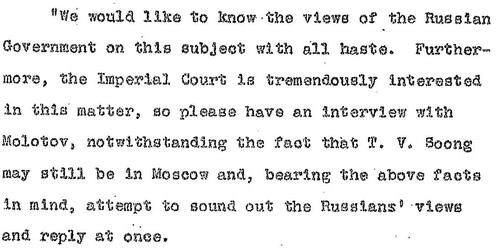
An excerpt from a July 12, 1945 US War Department summary of an intercepted cable from Japanese Foreign Minister Shigenori Togo to his ambassador to Russia
Posted on 08/06/2023 7:01:59 PM PDT by SeekAndFind
The anniversaries of the atomic bombings of Hiroshima and Nagasaki present an opportunity to demolish a cornerstone myth of American history — that those twin acts of mass civilian slaughter were necessary to bring about Japan’s surrender, and spare a half-million US soldiers who’d have otherwise died in a military conquest of the empire’s home islands.
Those who attack this mythology are often reflexively dismissed as unpatriotic, ill-informed or both. However, the most compelling witnesses against the conventional wisdom were patriots with a unique grasp on the state of affairs in August 1945 — America’s senior military leaders of World War II.
Let’s first hear what they had to say, and then examine key facts that led them to their little-publicized convictions:
General Dwight Eisenhower on learning of the planned bombings: “I had been conscious of a feeling of depression and voiced to [Secretary of War Stimson] my grave misgivings, first on the basis of my belief that Japan was already defeated and that dropping the bomb was completely unnecessary, and secondly because I thought that our country should avoid shocking world opinion by the use of a weapon whose employment was, I thought, no longer mandatory as a measure to save American lives. It was my belief that Japan was, at that very moment, seeking some way to surrender with a minimum loss of ‘face’.”
Admiral William Leahy, Truman's Chief of Staff: “The use of this barbarous weapon…was of no material assistance in our war against Japan. The Japanese were already defeated and ready to surrender because of the effective sea blockade and the successful bombing with conventional weapons.”
Major General Curtis LeMay, 21st Bomber Command: “The war would have been over in two weeks without the Russians entering and without the atomic bomb…The atomic bomb had nothing to do with the end of the war at all.”
General Hap Arnold, US Army Air Forces: “The Japanese position was hopeless even before the first atomic bomb fell, because the Japanese had lost control of their own air.” “It always appeared to us that, atomic bomb or no atomic bomb, the Japanese were already on the verge of collapse.”
Ralph Bird, Under Secretary of the Navy: “The Japanese were ready for peace, and they already had approached the Russians and the Swiss…In my opinion, the Japanese war was really won before we ever used the atom bomb.”
Brigadier General Carter Clarke, military intelligence officer who prepared summaries of intercepted cables for Truman: “When we didn’t need to do it, and we knew we didn’t need to do it…we used [Hiroshima and Nagasaki] as an experiment for two atomic bombs. Many other high-level military officers concurred.”
Fleet Admiral Chester Nimitz, Pacific Fleet commander: “The use of atomic bombs at Hiroshima and Nagasaki was of no material assistance in our war against Japan. The Japanese were already defeated and ready to surrender.”
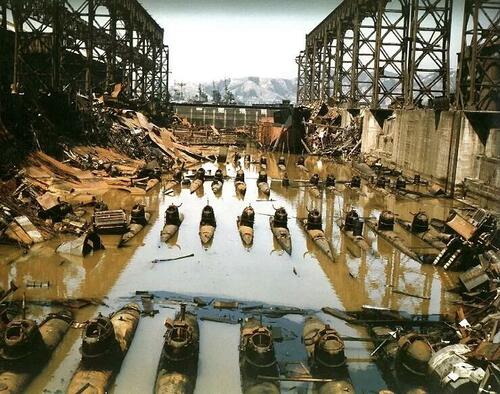
Putting out feelers through third-party diplomatic channels, the Japanese were seeking to end the war weeks before the atomic bombings on August 6 and 9, 1945. Japan’s navy and air forces were decimated, and its homeland subjected to a sea blockade and allied bombing carried out against little resistance.
The Americans knew of Japan’s intent to surrender, having intercepted a July 12 cable from Japanese Foreign Minister Shigenori Togo, informing Japanese ambassador to Russia Naotake Sato that “we are now secretly giving consideration to the termination of the war because of the pressing situation which confronts Japan both at home and abroad.”
Togo told Sato to “sound [Russian diplomat Vyacheslav Molotov] out on the extent to which it is possible to make use of Russia in ending the war.” Togo initially told Sato to obscure Japan’s interest in using Russia to end the war, but just hours later, he withdrew that instruction, saying it would be “suitable to make clear to the Russians our general attitude on ending the war”— to include Japan’s having “absolutely no idea of annexing or holding the territories which she occupied during the war.”
An excerpt from a July 12, 1945 US War Department summary of an intercepted cable from Japanese Foreign Minister Shigenori Togo to his ambassador to Russia
Japan’s central concern was the retention of its emperor, Hirohito, who was considered a demigod. Even knowing this — and with many US officials feeling the retention of the emperor could help Japanese society through its postwar transition —the Truman administration continued issuing demands for unconditional surrender, offering no assurance that the emperor would be spared humiliation or worse.
In a July 2 memorandum, Secretary of War Henry Stimson drafted a terms-of-surrender proclamation to be issued at the conclusion of that month’s Potsdam Conference. He advised Truman that, “if…we should add that we do not exclude a constitutional monarchy under her present dynasty, it would substantially add to the chances of acceptance.”
Truman and Secretary of State James Byrnes, however, continued rejecting recommendations to give assurances about the emperor. The final Potsdam Declaration, issued July 26, omitted Stimson’s recommended language, sternly declaring, “Following are our terms. We will not deviate from them.”
One of those terms could reasonably be interpreted as jeopardizing the emperor: “There must be eliminated for all time the authority and influence of those who have deceived and misled the people of Japan into embarking on world conquest.”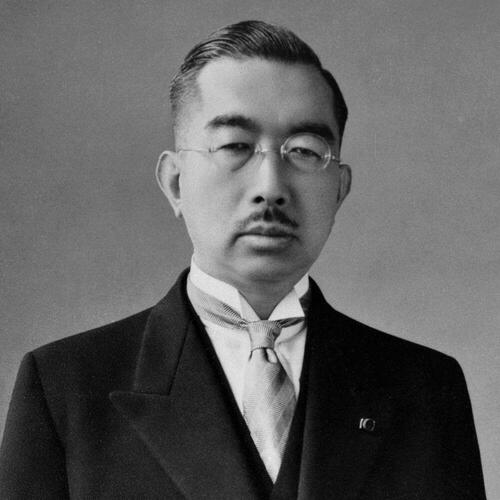
Japanese emperor Hirohito reigned from 1926 to 1989
At the same time the United States was preparing to deploy its formidable new weapons, the Soviet Union was moving armies from the European front to northeast Asia.
In May, Stalin told the US ambassador that Soviet forces should be positioned to attack the Japanese in Manchuria by August 8. In July, Truman predicted the impact of the Soviets opening a new front. In a diary entry made during the Potsdam Conference, he wrote that Stalin assured him “he’ll be in the Jap War on August 15th. Fini Japs when that comes about.”
Right on Stalin’s original schedule, the Soviet Union declared war on Japan two days after the August 6 bombing of Hiroshima. That same day — August 8 — Emperor Hirohito told the country’s civilian leaders that he still wanted to pursue a negotiated surrender that would preserve his reign.
On August 9, Soviet attacks commenced on three fronts. News of Stalin’s invasion of Manchuria prompted Hirohito to call a new meeting to discuss surrender — at 10 am, one hour before the strike on Nagasaki. The final surrender decision came on August 10.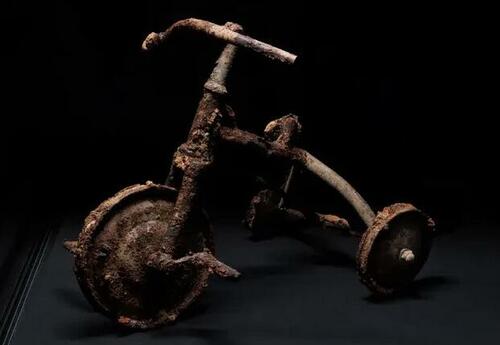
Three-year old Shinichi Tetsutani, burned as he was riding this tricycle when the atomic bomb hit Hiroshima, died a painful death that night (Hiroki Kobayashi/National Geographic)
The Soviet timeline makes the atomic bombings all the more troubling: One would think a US government that’s appropriately hesitant to incinerate and irradiate hundreds of thousands of civilians would want to first see how a Soviet declaration of war affected Japan’s calculus.
As it turns out, the Japanese surrender indeed appears to have been prompted by the Soviet entry into the war on Japan — not by the atomic bombs. “The Japanese leadership never had photo or video evidence of the atomic blast and considered the destruction of Hiroshima to be similar to the dozens of conventional strikes Japan had already suffered,” wrote Josiah Lippincott at The American Conservative.
Sadly, the evidence points to a US government determined to drop atomic bombs on Japanese cities as an end in itself, to such an extent that it not only ignored Japan’s interest in surrender, but worked to ensure that surrender was delayed until after upwards of 210,000 people — disproportionately women, children and elderly — were killed in the two cities.
Make no mistake: This was a deliberate targeting of civilian populations. Hiroshima and Nagasaki were chosen because they were pristine, and could thus fully showcase the bombs’ power. Hiroshima was home to a small military headquarters, but the fact that both cities had gone untouched by a strategic bombing campaign that began 14 months earlier certifies their military and industrial insignificance.
“The Japanese were ready to surrender and it wasn’t necessary to hit them with that awful thing,” Eisenhower would later say. “I hated to see our country be the first to use such a weapon.”
According to his pilot, General Douglas MacArthur, commander of US Army Forces Pacific, was “appalled and depressed by this Frankenstein monster.”
“When I asked General MacArthur about the decision to drop the bomb,” wrote journalist Norman Cousins, “I was surprised to learn he had not even been consulted…He saw no military justification for the dropping of the bomb. The war might have ended weeks earlier, he said, if the United States had agreed, as it later did anyway, to the retention of the institution of the emperor.”
What then, was the purpose of devastating Hiroshima and Nagasaki with atomic bombs?
A key insight comes from Manhattan Project physicist Leo Szilard. In 1945, Szilard organized a petition, signed by 70 Manhattan Project scientists, urging Truman not to use atomic bombs against Japan without first giving the country a chance to surrender, on terms that were made public.
In May 1945, Szilard met with Secretary of State Byrnes to urge atomic restraint. Byrnes wasn’t receptive to the plea. Szilard — the scientist who’d drafted the pivotal 1939 letter from Albert Einstein urging FDR to develop an atomic bomb — recounted:
"[Byrnes] was concerned about Russia's postwar behavior. Russian troops had moved into Hungary and Rumania, and Byrnes thought it would be very difficult to persuade Russia to withdraw her troops from these countries, that Russia might be more manageable if impressed by American military might, and that a demonstration of the bomb might impress Russia."
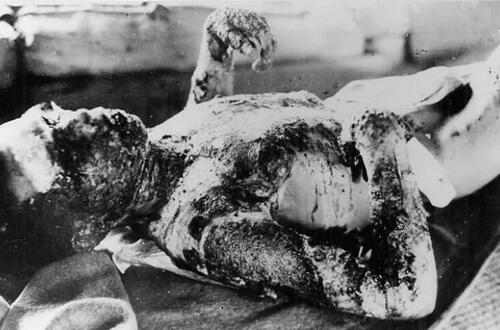
Whether the atomic bomb’s audience was in Tokyo or Moscow, some in the military establishment championed alternative ways to demonstrate its power.
Lewis Strauss, Special Assistant to the Navy Secretary, said he proposed “that the weapon should be demonstrated over… a large forest of cryptomeria trees not far from Tokyo. The cryptomeria tree is the Japanese version of our redwood… [It] would lay the trees out in windrows from the center of the explosion in all directions as though they were matchsticks, and, of course, set them afire in the center. It seemed to me that a demonstration of this sort would prove to the Japanese that we could destroy any of their cities at will.”
Strauss said Navy Secretary Forrestal “agreed wholeheartedly,” but Truman ultimately decided an optimal demonstration required burning hundreds of thousands of noncombatants and laying waste to their cities. The buck stops there.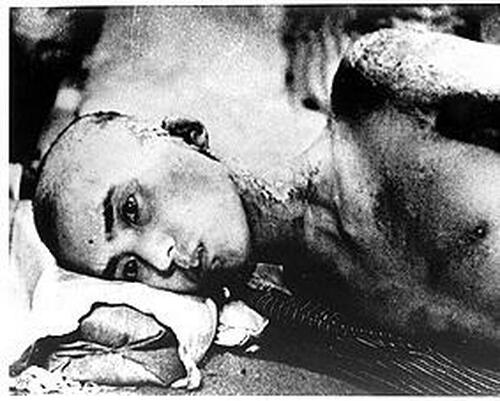
A victim of the atomic bomb
The particular means of inflicting these mass murders — a solitary object dropped from a plane at 31,000 feet — helps warp Americans’ evaluation of its morality. Using an analogy, historian Robert Raico cultivates ethical clarity:
“Suppose that, when we invaded Germany in early 1945, our leaders had believed that executing all the inhabitants of Aachen, or Trier, or some other Rhineland city would finally break the will of the Germans and lead them to surrender. In this way, the war might have ended quickly, saving the lives of many Allied soldiers. Would that then have justified shooting tens of thousands of German civilians, including women and children?”
The claim that dropping the atomic bombs saved a half-million American lives is more than just empty: Truman’s stubborn refusal to provide advance assurances about the retention of Japan’s emperor arguably cost American lives.
That’s true not only of a war against Japan that lasted longer than it needed to, but also of a Korean War precipitated by the US-invited Soviet invasion of Japanese-held territory in northeast Asia. More than 36,000 US service members died in the Korean War — among a staggering 2.5 million total military and civilian dead on both sides of the 38th Parallel.
We like to think of our system as one in which the supremacy of civilian leaders acts as a rational, moderating force on military decisions. The needless atomic bombing of Hiroshima and Nagasaki — against the wishes of World War II’s most revered military leaders — tells us otherwise.
Sadly, the destructive effects of the Hiroshima myth aren’t confined to Americans’ understanding of events in August 1945. “There are hints and notes of the Hiroshima myth that persist all through modern times,” State Department whistleblower and author Peter Van Buren said on The Scott Horton Show.
The Hiroshima myth fosters a depraved indifference to civilian casualties associated with US actions abroad, whether it’s women and children slaughtered in a drone strike in Afghanistan, hundreds of thousands dead in an unwarranted invasion of Iraq, or a baby who dies for lack of imported medicine in US-sanctioned Iran.
Ultimately, to embrace the Hiroshima myth is to embrace a truly sinister principle: That, in the correct circumstances, it’s right for governments to intentionally harm innocent civilians. Whether the harm is inflicted by bombs or sanctions, it’s a philosophy that mirrors the morality of al Qaeda.
That’s not the only thread connecting 1945 to 2023, as Truman’s insistence on unconditional surrender is echoed by the Biden administration’s utter disinterest in pursuing a negotiated peace in Ukraine.
Today, confronting an adversary with 6,000 nuclear warheads — each a thousand times more powerful than the bombs dropped on Japan — Biden’s own stubborn perpetuation of war puts us all at risk of sharing the fate of Hiroshima and Nagasaki’s innocents.
Nonsense
Yes the bomb could have not been dropped, but it was.
If it wasn’t, the post-WW2 world would have been much different because the US wouldn’t have ended the war on its terms but accepting the terms that the Russians negotiated because Russia was steaming through Manchuria with a million man army and the US was getting ground up in Okinawa and needed to move troops from Europe to the Pacific to have enough forces to sustain expected casualties from a mainland assault.
FDR had the gall to die in April 1945, before the Trinity test. Truman didn’t even have full understanding of the Manhattan project or its readiness until assuming office and he had to look like a strong war leader around Stalin almost immediately.
If Truman didn’t end the war as quickly as possible, he would be seen as weak against Stalin and Churchill, and if didn’t use the bomb, his other option was to commit a million US troops to be eaten up by the Japanese in a full invasion after the horrors of Okinawa.
Truman was thrust in charge of a government nearly at the end of a world war, which spent all of the war developing this terrible new weapon for exactly the type of mission it eventually was used for.
All of this second guessing and “we didn’t need to drop the bomb” stuff is great monday-morning quarterbacking, but it is also greatly oversimplifying history in a way that, amazingly, is making America look like bad guys and the Soviets look like the good guys.
If the soviets dictated the terms of peace in Japan, all of asia would be communist by the 1960s and the Soviets would still have gotten the bomb.
This is a serious historical error. It should read:
...after upwards of 210,000 people — disproportionately women, children, LGBTQs, persons of color, trans womyn and men, and historically otherwise disadvantaged persons and also elderly — were killed in the two cities.
Ditto. My father was a 19-year-old naval fighter pilot just out of flight school. His carrier was on its way to the Sea of Japan.
If Truman had refused to use the nukes and had instead sent thousands of American soldiers to die invading Japan he would have been impeached and likely imprisoned for treason.
Japan refused to surrender after we nuked Hiroshima, just like they refused to surrender after we had firebombed Tokyo to rubble. They only surrendered after we nuked Nagasaki and convinced them that we would continue to nuke Japanese cities every few days until they did (which we couldn't have actually done, since we had used up all of our nukes).
And it eliminated the chance for a “stabbed in the back” situation.
Can you imagine if the Chicoms got into Japan with revenge on their minds?
You are correct in this. The Left (including the media) has been pushing the "inhumane/racist/unnecessary" line since the end of the war.
I read a book by the incomparable Richard Feynman (a wunderkind 27 year old physicist working on the Manhattan Project, one of the youngest who was in intellectual step with the likes of the old guard geniuses like Bohr) where he said that a lot of the moral handwringing during the project is overwrought and overstated as it is shown in stupid movies and books by Leftists since then. He has maintained that people were there doing a job, and nearly everyone was onboard, working to get the job done.
I believe the truth of calling the use of the weapons "inhumane, racist, and unnecessary" is as responsible for people who have disowned it or distanced themselves from it since 1945, is much the same dynamic as people who say things today who take stances on racism to avoid being labeled as racists.
Many of them didn't want to be held responsible for creating the weapon if we got into a nuclear exchange where hundreds of millions of people would die. (this is my opinion on this, not a stated fact)
More attempts by the left at revisionist histor
/\
My take also.
I don’t beleive a single quote.
I’ve read a lot of ww2 generals autobiographies
It’s impossible to prove a person never said something.
It is incombent upon the one asserting the quotes that they are factual.
Prove it.
Prove it.
I looked up the Eisenhower quote. It’s genuine:
\/
I read his autobiography.
I don’t beleive it’s genuine just cuz some link said it was.
Doesn’t sound anything close to his biography.
You stated it was a certain fact they were fake quotes.
But you cannot substantiate that assertion.
I asserted nothing other than you cannot substantiate yours. And that’s easily substantiated.
Admiral Nimitz clearly showed a distaste for this weapon, as did someone like Admiral Lockwood (in his book, “Sink ‘Em All” where he spends most of the last chapter expressing his dislike of the concept of nuclear weapons. He was in charge of sub warfare in the Pacific in WWII)
It isn’t uncommon in things I have read about many of those men to see them distance themselves from the weapons, so some of those quotes may or may not be true. But they don’t surprise me.
But as another poster stated, it doesn’t make any difference what they said. To understand the exigencies of the times, you look at what they did, even though many of them did not know details of the project.
Utterly stupid. Pack of lies. We took 27,000 casualties at Iwo Jima. We took 50,000 more on Okinawa.
Bet none of the guys who were going to land and fight on the home islands, sail around them for another year, or fly above them agreed with this.
Go over these opinions. Ike, spent his time in Europe. What the hell did he know about Japan? Ever hear Joe Stillwell or USMC Vandegriff opining about the ETO?
LeMay? Angry that the bomb was seen as the death blow rather than his fire raids.
Also, all the others made these statements in the 1950s when the order of the day was “make nice with Japan because of Korea and Cold War” so there was some ass kissing going on.
As for Leahy; Truman’s Memoirs: Year of Decisions, Leahy was skeptical about the atomic bomb, saying: “That is the biggest fool thing we have ever done. The bomb will never go off, and I speak as an expert in explosives.”
Lots of post war agendas happening. But no fighting men thought any such thing. Between Iwo Jima and Okinawa we lost 20,000 dead, and 55,000 wounded. Jap resistance was increasing. Geezer officers born in the late 1800s had the luxury to think that way. Men facing death, or another year in the Pacific for a starvation of Japan blockaid didn’t.
This is childish America hate and comes up every year.
there was a 4 year period, 45-49, when the USA was the ONLY nuclear Nation. Imagine if it was reversed and it was the Soviets that had the bomb. They would have rampaged all thru World. Should thank their lucky stars things turned out the way they did....besides..this was total war. Civilians were legit targets. More died at Dresden etc...the World was numb to mass death by this time.
That was published in 1963.
And reads like revisionist history.
Generals don’t always say the brightest things. Chesty Puller once said, to a reporter, that he’d trade a deuce and a half full of dog tags for a MOH. Ouch!
he got elected by saying you should use nuclear weapons just as you would any other weapon.
The foreign ministry who wanted to surrender and was already quietly drafting a new constitution for the country was effectively neutered in the government control of the war. They were using back channels that they had before the war to try to stop the war before the nuke strikes. The Imperial Army was controlling the war and the emperor. They were not going to give up. I would not want to drop them but Truman did not have the needed info not to deploy the weapon. 20/20 sight after the war had all these folks regretting the action afterwards as this is a difficult actions to choose and they wanted to distance themselves from the action and justify the decision by separating themselves from it.
This book made me think a lot about the war.
https://www.thriftbooks.com/w/the-pacific-war-1931-1945—a-critical-perspective-on-japans-role-in-world-war-ii-the-pantheon-asia-library_saburo-ienaga/290593/item/2466340/?utm_source=google&utm_medium=cpc&utm_campaign=high_vol_midlist_standard_shopping_customer_acquisition&utm_adgroup=&utm_term=&utm_content=666157863328&gclid=EAIaIQobChMIiZzI9sfJgAMVcYVaBR2u4gwCEAQYBiABEgLPHPD_BwE#idiq=2466340&edition=2384829
Saburo ienaga’s book paints a different picture from these folks. Japan was willing to go down if the GoJ was not shocked. The civilian deaths would be great as the soldiers would have massacred thier own people . I assume the marines would be assaulting the shoreline of Hokkaido after killing thier way through the rest of the country.
Pure BS. Maybe the idiots shouldn’t have “needlessly” bombed Pearl Harbor.
Disclaimer: Opinions posted on Free Republic are those of the individual posters and do not necessarily represent the opinion of Free Republic or its management. All materials posted herein are protected by copyright law and the exemption for fair use of copyrighted works.